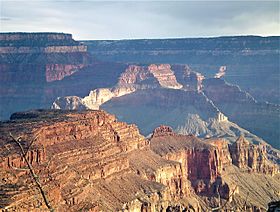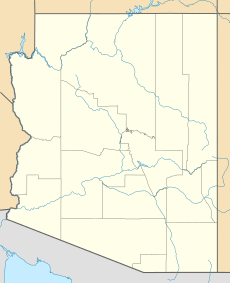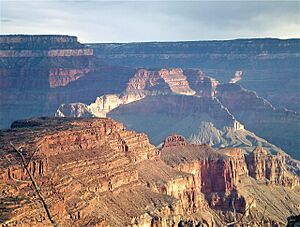Wallace Butte facts for kids
Quick facts for kids Wallace Butte |
|
|---|---|

Huxley Terrace & Wallace Butte
(foreground) |
|
| Highest point | |
| Elevation | 5,209 ft (1,588 m) |
| Prominence | 349 ft (106 m) |
| Isolation | 1.73 mi (2.78 km) |
| Parent peak | Mount Huethawali |
| Naming | |
| Etymology | Alfred Russel Wallace |
| Geography | |
| Location | Grand Canyon National Park Coconino County, Arizona, US |
| Parent range | Coconino Plateau, Colorado Plateau |
| Topo map | USGS Havasupai Point |
| Geology | |
| Age of rock | Pennsylvanian down to Cambrian |
| Mountain type | sedimentary rock: sandstone,siltstone, mudstone, limestone, shale |
| Type of rock | Manakacha Formation-(Supai unit 2: prominence-(upper unit) Watahomigi Formation-(lower unit) Supai Group-(units 2, 1) Redwall Limestone, Muav Limestone, Bright Angel Shale |
Wallace Butte is a mountain peak that stands 5,209 feet (about 1,588 meters) tall. It is located in the western part of the Grand Canyon in Arizona, United States. This peak is on the South Rim of the canyon.
Wallace Butte is about 1 mile northwest of an area called the Grand Scenic Divide. It is also about 1.73 miles northeast of Mount Huethawali. The peak sits roughly 3/4 mile south of the Colorado River, which flows west through the canyon.
What is Wallace Butte?
Wallace Butte is a type of mountain called a "butte." A butte is a tall, flat-topped hill with steep sides. It is smaller than a mesa. Buttes are often formed when softer rocks around them wear away, leaving the harder rock standing tall.
This butte is named after Alfred Russel Wallace. He was a famous British naturalist and explorer. He is known for developing the theory of evolution by natural selection, similar to Charles Darwin.
How Wallace Butte Formed
Wallace Butte is made of different layers of rock. These rocks are mostly sedimentary rocks. This means they were formed from layers of sand, mud, and other materials that piled up over millions of years. Then, they were pressed together.
The main rock layers you can see at Wallace Butte are part of the Supai Group. This group includes the Manakacha Formation and the Watahomigi Formation. These layers sit on top of the Redwall Limestone.
The Redwall Limestone is a very strong rock layer. It forms many cliffs and flat areas throughout the Grand Canyon. It acts like a strong base for many of the peaks and formations above it, including Wallace Butte.
The cliffs of the Manakacha Formation protect the softer rock layers below them. This is why Wallace Butte has its distinct shape. It is a triangular shape, about 350 feet long and 150 feet wide.




